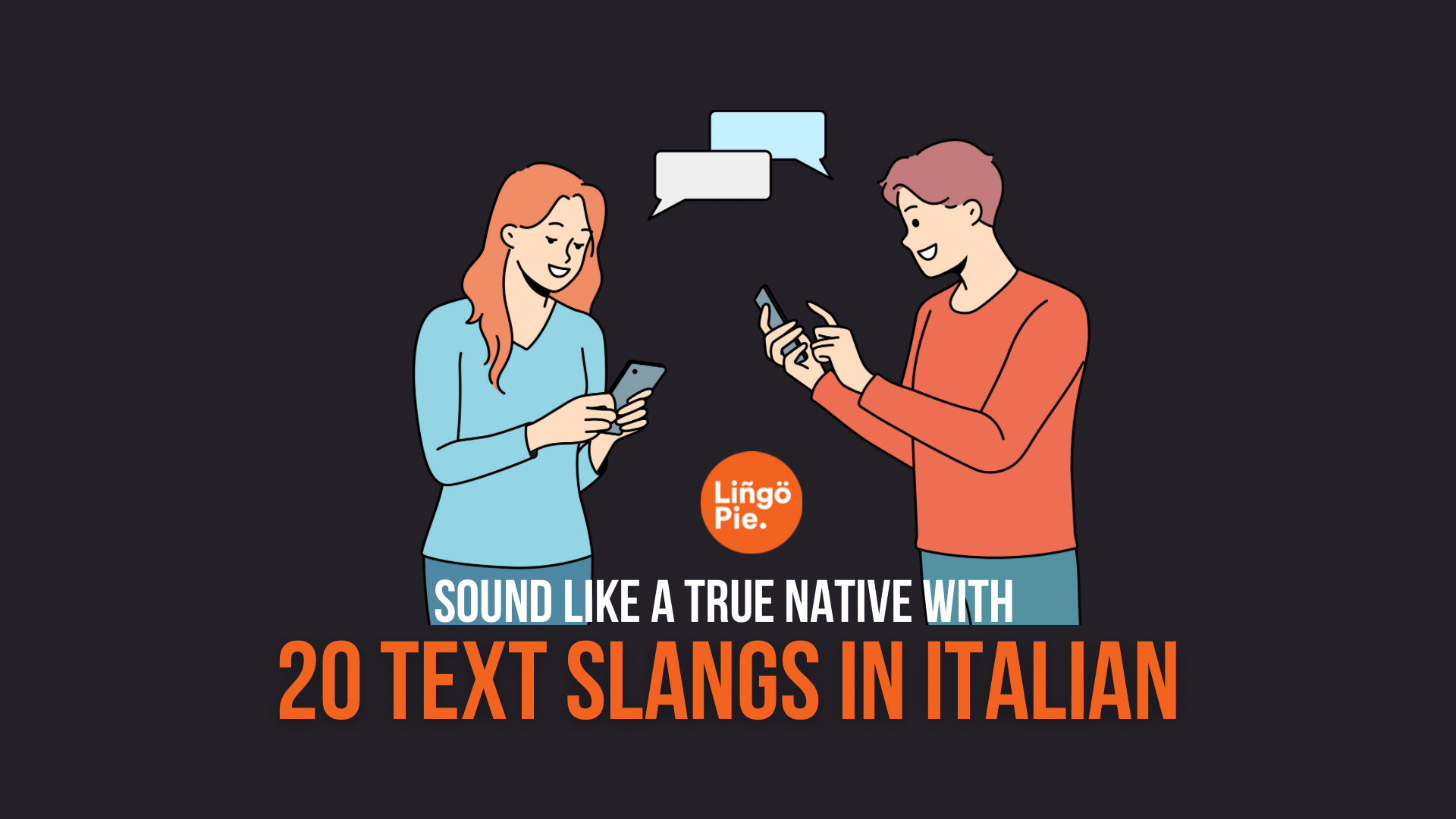Learning a language goes beyong grammar points and boring books. In the process of learning portuguese, just like any other language, it's important to familiarize yourself with its colloquial expressions and slangs. Portuguese, a beautiful and vibrant language spoken by millions around the world, is no exception. In this article, we'll explore ten popular Portuguese slangs that will add flair and authenticity to your language skills. So, let's dive in and discover some exciting expressions that will make you sound like a native Portuguese speaker!

Portuguese Slangs to Speak Like a Native
Bacana
Used to describe something cool, awesome, or fantastic, "bacana" is a widely used slang in Portugal and Brazil. Whether you're complimenting a friend's outfit or expressing admiration for a remarkable accomplishment, this word will come in handy.
Pô
This versatile expression is commonly used in casual conversation and serves various purposes. It can be an exclamation of surprise, a way to express disbelief, or simply used as a filler word when pausing to gather your thoughts. You'll hear this one a lot, so don't be afraid to incorporate it into your Portuguese repertoire.
Legal
No, we're not talking about the legal system here! In Portuguese slang, "legal" means "cool" or "nice." It's a simple and widely used term to express approval or satisfaction with something. From complimenting a friend's new hairstyle to praising a delicious meal, "legal" is an essential slang word to have in your vocabulary.
Muito da hora
This Brazilian slang expression is similar to "bacana" and means "very cool" or "awesome." It's a more enthusiastic way to show excitement or admiration. Use it to express your enthusiasm for a concert, a party, or any other enjoyable experience.
Ficar de boa
Literally translated as "to stay of good," this slang phrase is used to convey a sense of relaxation or not having any worries. It means to chill out, take it easy, or simply hang out without any specific plans. Next time you want to suggest a laid-back activity, like watching a movie or having a casual get-together, use this expression.
Mandar bala
This expression is quite popular in Brazil and means "to go for it" or "to take action." It is used to encourage someone to pursue their goals, take risks, or tackle a challenge head-on. So, if you want to motivate a friend or show support, "mandar bala" is the perfect slang phrase to use.
Tá ligado

This phrase literally translates to "are you connected?" but it's used informally to mean "are you following me?" or "do you understand?" It's a way to check if the other person is paying attention or comprehending what you're saying. It's a common slang expression in Brazil, so incorporating it into your conversations will make you sound more fluent.
Dar mole
In Portuguese slang, "dar mole" means "to make a move" or "to flirt." It's often used to describe someone who is trying to hit on another person or showing romantic interest. Whether you're discussing a friend's love life or giving advice, using this phrase will add a touch of authenticity to your Portuguese conversations.
Rolar
Derived from the verb "to roll," this slang term is widely used in Brazil to mean "to happen" or "to go down." It's a versatile expression used to describe events, plans, or situations. If you want to ask what's going on or find out about upcoming events, use "rolar" to sound like a native speaker.
Papo reto
This Brazilian slang expression translates to "straight talk" or "straight up." It means speaking honestly, directly, and without beating around the bush. Use this phrase when you want to have a serious conversation or provide sincere advice. It's a powerful slang term that reflects the Brazilian directness and authenticity.
Ranço

The Brazilian slang "ranço" is an informal term that has gained popularity in recent years, particularly on social media and in colloquial conversations. It is often used to express a feeling of disgust, annoyance, or contempt towards someone or something.
The term "ranço" can be roughly translated as "aversion" or "disgust" in English, but it carries a stronger connotation. It implies a deep-seated, lingering negative sentiment or resentment towards a particular person, situation, or idea.
When someone says they have "ranço" of something or someone, it means they strongly dislike or have a strong negative reaction towards it. It can be used to describe a persistent feeling of irritation, dissatisfaction, or even hatred. However, it is important to note that the term is often used in a lighthearted or exaggerated manner in informal conversations, rather than conveying genuine hostility.
The usage of "ranço" has evolved in recent years and has become a popular way for Brazilians to express their dislikes or vent their frustrations in a playful or humorous manner. It has also gained traction as a meme and hashtag on social media platforms.
Overall, "ranço" is a Brazilian slang term that encapsulates a strong feeling of aversion or disgust, often used in a lighthearted or exaggerated manner to express discontent or displeasure towards someone or something.
Perrengue

The Brazilian expression "perrengue" refers to a difficult or challenging situation. It describes moments of adversity or discomfort in life. Whether facing financial difficulties or experiencing physical discomfort, "perrengue" encompasses various challenging experiences. It reflects the Brazilian spirit of resilience and resourcefulness in navigating and overcoming tough circumstances.
Zueira
The Brazilian expression "zueira" is a popular slang term that encompasses the concept of humor, joking, and playful banter. It is used to describe a lighthearted and fun atmosphere where people engage in playful teasing, pranks, or light-hearted mockery.
"Zueira" is all about creating an enjoyable and entertaining environment through humor and friendly jesting. It is commonly used among friends, especially in social gatherings, parties, or informal settings, where people engage in witty remarks, funny remarks, and light-hearted teasing.
The term "zueira" is closely related to the Brazilian culture of "brincadeiras" (playful activities) and is often associated with good-natured humor and a positive vibe. It is about having fun, laughing together, and creating a relaxed and enjoyable atmosphere.
It's important to note that "zueira" is typically meant to be light-hearted and not intended to offend or hurt anyone's feelings. It thrives on a mutual understanding and acceptance of playful exchanges among friends or acquaintances.
Mas até aí tudo bem...

Picture this: You're strolling through the vibrant streets of Brazil, engaging in lively conversations with the locals, and you come across the Brazilian slang "Mas até aí tudo bem." Now, hold onto your hats because we're about to unravel this phrase in a fun and colorful way!
The Brazilian slang "Mas até aí tudo bem" is an expression commonly used in informal conversations. It can be translated as "But until there, everything's fine" or "But so far, so good" in English.
This phrase is often used to indicate that things that are already not going smoothly or as expected but it turns out to be even worse. Even though the meaning is "so far soo good", in reality is just a filler word to add a little bit of "spice" and more drama to the story.
É sobre isso e tá tudo bem

The Brazilian expression "É sobre isso e tá tudo bem" translates to "it's about that and it's okay." It's often used as a way to express acceptance or resignation, similar to the phrase "it is what it is." A shorter version, "É sobre isso," is also commonly used to convey agreement or recognition. These phrases capture the idea of acknowledging a situation or point and finding contentment or understanding in it.


European Portuguese Slangs
Tuga
This is a popular slang used to refer to Portuguese people. It’s an informal and friendly way to describe someone from Portugal, often used with pride.
Fixe

“Fixe” means "cool" or "awesome." It's one of the most commonly used words among Portuguese people when talking about something they like or enjoy.
Bué
This slang word means "a lot" or "very." For example, "Estou bué cansado" translates to "I’m very tired." It’s frequently used in casual conversations.
Bacalhau

While "bacalhau" literally means "codfish," it's also slang for giving a handshake or greeting someone in a friendly way. It's an integral part of Portuguese culture.
Porreiro
Similar to "fixe," this word means "cool" or "great." It’s used to express approval or satisfaction, often said in response to a good plan or idea.
Puto / Pita
"Puto" is slang for a young boy, and "pita" is for a young girl. They are often used informally when referring to kids or teenagers. But be careful, if speaking to a brazilian puto this will mean a prostitute.
Giro/Gira
“Giro” (for males) and “gira” (for females) are commonly used to describe something or someone attractive or nice. You might hear someone say, "Ela é gira" ("She’s cute").
Cota

"Cota" is used to refer to someone older, often a parent or an older person. It's not necessarily derogatory and can be said in a friendly, casual way.
Estar na boa
This phrase translates to "being good" or "being chill." It’s used to say that someone is relaxed or not stressed about a situation, similar to "all good."
Tretas
"Tretas" means nonsense or lies. If someone is telling "tretas," they’re telling fibs or making things up that aren’t true. You can call out "não me venhas com tretas!" (Don’t give me nonsense!). In Brazilian Portuguese, "treta" refers to a conflict, problem, or fight, often involving drama or a complicated situation. It can also be used to describe a tricky or deceitful situation. For example, "Deu uma treta na festa" means "There was a fight at the party," or "Isso é uma treta" means "That’s a messy situation."
Cultural Context for Portuguese Slang
Portuguese slang varies significantly across different regions. In Brazil, "legal" means "cool," while in Portugal, "fixe" is used for the same concept. This difference highlights the importance of understanding regional context when using slang.
Urban areas tend to have more dynamic and evolving slang compared to rural settings. In cities, new expressions emerge rapidly, while rural areas often preserve more traditional language forms.
Generational Divide
Generational differences play a crucial role in slang usage:
- Youth culture: Younger generations often use slang to establish identity. Words like "top" are popular among Brazilian teens.
- Older generations: They tend to use more traditional expressions, reflecting the evolution of language over time.
Understanding these generational gaps can help in effective communication across age groups.
Media's Role
Media plays a significant role in shaping and spreading slang:
- Popular media (TV, movies, music) frequently introduce new terms. Brazilian novelas, for instance, are a major influence on slang creation and popularization.
- Social media platforms like Twitter and Instagram accelerate the spread and evolution of slang, creating a fast-paced environment for language change.
Cultural Roots and Significance
Many slang terms have deep cultural roots. For example, "bicho" in Portugal, meaning "guy," evolved from the word for "animal." This historical background adds layers of meaning to seemingly simple expressions.
Additionally, certain slang terms carry socio-political connotations, reflecting the cultural and political landscapes of different regions. Understanding these nuances can provide insight into broader social contexts.
Practical Usage
When using Portuguese slang, context is key. While slang is perfect for informal settings, it can be inappropriate in professional contexts. Non-native speakers should be particularly cautious to avoid misunderstandings.
For instance, "cara" in Brazil means "guy," but it also means "face." Such dual meanings can lead to confusion if not used correctly.
- "Legal" (Brazil) This widely used term among Brazilian youth means "cool" or "nice." It originates from the word for "legal," implying something legitimate or good.
- "Fixe" (Portugal) Commonly used in casual Portuguese conversations, "fixe" means "cool" or "great." It's an essential part of informal Portuguese vocabulary.
By understanding these cultural contexts and practical usage tips, learners can navigate the rich world of Portuguese slang more effectively, enhancing their language skills and cultural awareness.

Learn Portuguese Slangs with Lingopie
Unlock a World of Language Learning Adventure! Say goodbye to dull textbooks and hello to Lingopie, the dynamic platform that uses TV shows and music to make learning Portuguese slangs and idioms engaging and immersive. But how can you make the most of Lingopie to learn Portuguese slangs?
First, dive into the wide range of TV shows and music available on the Lingopie platform that feature authentic language and cultural nuances. Immerse yourself in the Portuguese slang spoken by native speakers in real-life contexts.
Next, utilize Lingopie's interactive features such as flashcards and quizzes to reinforce your knowledge and understanding of Portuguese slangs. Challenge yourself and track your progress as you navigate through the exciting learning materials.
Don't forget to take advantage of Lingopie's personalized recommendations. Tailored to your interests and proficiency level, these recommendations guide you towards the perfect content to further expand your Portuguese slang vocabulary.
With Lingopie's 7-day Free Trial, you have the opportunity to explore the platform fully and experience the benefits firsthand. Take this chance to unlock a world of linguistic wonders and embark on a rewarding language-learning adventure.
So what are you waiting for? Start your language-learning journey with Lingopie and watch your Portuguese slang skills flourish!






![Learn Spanish Curse and Slang Words with Narcos [Free Guide]](/blog/content/images/size/w1200/2022/09/curse-words-narcos.png)


![How To Learn Portuguese Fast? [Best 2025 Guide]](/blog/content/images/size/w300/2024/08/Lingopie-2.png)
